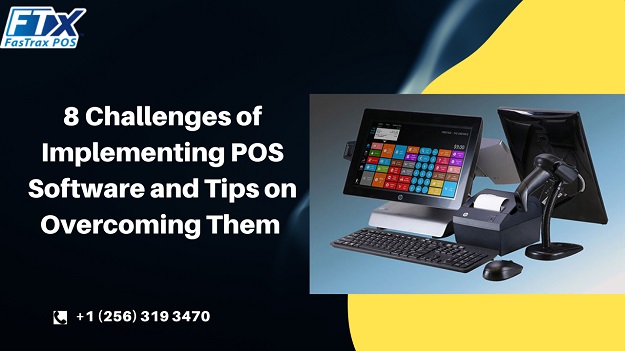A POS or point-of-sale system is a vital part of any retail business. Its software handles transactions, inventory, customer data, and more. In short, it’s what makes your business run smoothly. But POS systems can be complex and expensive, often requiring significant changes to your business’s current infrastructure. Here are some challenges you may face when implementing POS software and tips on overcoming them.
1. High Up-Front Costs
One of the biggest challenges of implementing POS software is the high up-front costs. Between the cost of the software itself and the cost of integrating it into your current system, you’re looking at a substantial investment. However, many businesses find that the long-term benefits of POS software outweigh the up-front costs. To offset the price, you may want to consider renting or leasing POS hardware and software instead of purchasing it outright.
2. Complex Installation
Another challenge you may face is a complex installation process. Depending on the features you want, and the size of your business, installing retail POS software can be a complicated endeavor. Make sure you clearly understand the installation process before you begin, and give yourself plenty of time to get everything up and running smoothly. You may also consider hiring an outside consultant to help with the installation process if it is too complex for your in-house team to handle.
3. Lack of Training
Once you have your POS system up and running, you’ll need to train your employees on how to use it correctly. This can be another challenge because not everyone learns new software quickly or easily. Please ensure you allow plenty of time for training and ensure your employees understand how important it is to use the system correctly. You may also want to offer incentives for employees who master the POS system quickly to help train their colleagues.
4. Compatibility Issues
One common issue with any software is compatibility issues. If your POS software is incompatible with your current hardware or vice versa, you’ll likely quickly run into problems. To avoid this issue, do your homework before purchasing any hardware or software to ensure it will be compatible with what you already have in place. When considering outside consultants for installation or training services, you should also ask about compatibility.
5. Data Security Concerns
Any time you’re dealing with sensitive customer data, security concerns will be at the forefront of your mind—and rightfully so! When choosing POS software, select a system with robust security features that will protect your customers’ data and your business’s data from potential threats like hackers or viruses.
6. Constant Upgrades
Technology is constantly evolving, so POS systems must become to stay effective. That means regular upgrades are necessary—which can sometimes be costly depending on how extensive they are. To keep costs down, try to choose a POS system that uses an open platform so you can take advantage of free or low-cost updates as they become available. Otherwise, regular factor upgrade costs into your budget, so unexpected expenses do not catch you off guard.
The Benefits of a POS System for Business Owners
1. Increased Efficiency
A POS system can help you streamline your sales process and become more efficient. For example, you can set up your POS systems to accept payments directly from customers, eliminating the need for a separate payment processing terminal. You can also track inventory levels in real-time, so you always know what products are in stock and need to be reordered.
2. Improved Customer Service
A POS system can help you provide better customer service by keeping track of customer purchase history and preferences. This information can offer targeted deals and promotions, which will keep customers returning to your business. Additionally, many POS systems come with built-in loyalty programs that allow you to reward your best customers with discounts and perks.
3. Valuable Business Insights
POS software can give you valuable insights into your business that can help you make informed decisions about where to focus your efforts. For example, you can use data from your POS system to see which products are selling well and which ones need to be discounted or discontinued. You can also use data from your POS system to identify trends in customer behavior, such as the times of day when your store is busiest.
4. Reduced Costs
A POS system can help you reduce costs by eliminating the need for paper records and manual data entry. Additionally, many POS systems offer low-cost or free cloud-based plans that allow you to access your data from anywhere with an internet connection. And since a POS system can help you increase efficiency and boost profits, it will ultimately pay for itself many times.
Conclusion
Implementing POS software can provide your business with a competitive edge. However, there can be some challenges when implementing such a system. In this blog post, we’ve looked at 8 of the most common challenges businesses face when implementing POS software and some tips on overcoming them. With proper planning and execution, you can successfully implement POS software in your business and reap its many benefits.

